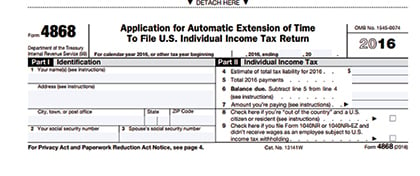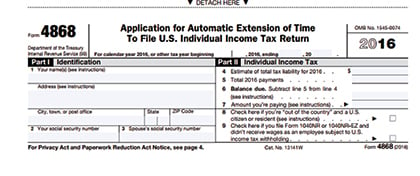Each year, some taxpayers find themselves scrambling to find their income tax return paperwork, a year's worth of receipts, and ultimately becomes stressed in the attempt to file their tax return by April 18. Others know and understand that simply filing a tax extension can earn them time, reduce their stress, and possibly, incur a lower tax bill.
A tax extension is free, easy and automatic. Just submit Form 4868 electronically or on paper by the April 18 filing deadline. 
“We explain to clients the many advantages of filing an extension. Not only do they gain six more months to file their return, but they also have the ability to review their options and understand their return a little better. This helps plan strategically not only for the current tax year, but this extra time also enables us to potentially project a client’s tax position for the following year as well. By having the ability to look at two years at once, we can provide the client with an optimal strategy to reduce their tax obligations,” said Senior Tax Manager Gary Sigman, CPA, M.Tax, PFS, AEP.
You'll also avoid failure-to-file penalties, which can add up to 25% of the tax due. If you file an extension but miss the extended deadline, you will be subject to this penalty. Keep in mind that filing an extension when you owe taxes only gives you more time to file, not more time to pay – your payment is still due at the April deadline.
What does filing an extension do?
- An extension is a form filed with the IRS to request additional time to file your federal tax return. The extension period is six months, which extends the due date for submitting your final returns from April 15 to Oct. 15*. In some states, filing an extension with the IRS will automatically extend the time to complete a state income tax return.
- Filing an extension grants you additional time to submit your complete and accurate return, but you still need to estimate whether you will owe any taxes and pay that estimated balance by April 18.
- Extending your return allows you and your CPA more time to prepare your tax return to ensure filing of an accurate tax return. In many cases, you may still be waiting for additional information (e.g., Schedule K-1, corrected 1099s, etc.) to complete your return.
Why does my CPA suggest we extend my tax return?
If your CPA has recommended that you file an extension, it may be due to many reasons, such as:
- The volume of data or complexity of certain transactions (e.g., sale of a rental property) on your return requires additional time.
- The amount of time remaining in filing season is limited for the CPA to complete client returns by April 15* due to late information received from numerous clients.
- Many CPAs have a “cutoff” or deadline for clients submitting their tax information so they can plan their workload to ensure all client returns and extensions are completed by April 15*.
Am I more likely to be audited if I extend?
- Extending will NOT increase your likelihood of being audited by the IRS.
- It is better to file an extension rather than to file a return that is incomplete or that you have not had time to review carefully before signing.
What are the primary benefits of extending my tax return?
- It provides for additional time to file returns without penalty when you are waiting for missing information or tax documents (such as corrected 1099s). Just remember that an extension provides additional time to file, but not additional time to pay. Penalties may be assessed if sufficient payment is not remitted with the extension.
- You may qualify for additional retirement planning opportunities or additional time to fund certain types of retirement plans (e.g., SEP IRA).
- It is often less expensive (and easier) to file an extension rather than rushing now, then possibly needing to amend your return later.
Should I do anything differently if I am filing an extension or “going on extension”?
- No, you still should give your CPA whatever information you have as early as possible or as soon as it becomes available.
- Expect to pay any anticipated taxes owed by April 18. You still need to submit all available tax information to your CPA promptly so he/she can determine if you will have a balance due or if you can expect a refund.
- If you are required to make quarterly estimated tax payments, your first quarter estimated tax payment is due April 18. Your CPA may recommend that you pay the balance due for last year and your first quarter estimated tax payment for this year with your extension.
- If you are anticipating a large refund, chances are your CPA will likely try to get your extended return done as soon as possible once all tax information is available. Your CPA may also want to discuss tax planning opportunities with you so that in future years, you don’t give the IRS an interest-free loan all year!
Is there anything I can do to avoid filing an extension if I know I am missing some
information now?
- If you already know you will be waiting until the last minute for one or two documents, you may be able to minimize the chance of having to file an extension by providing all other available documents to your CPA as soon as you receive them. By doing so, your CPA can prepare a draft return for you to review and discuss in advance. He or she may be able to add the missing piece of data or last-minute information and still be able to complete your returns by April 15* (depending on their workload).
I heard about changes to due dates beginning with 2016 tax returns filed in 2017. Will that affect me?
- Changes in due dates relate to partnership and some business (C corporation) returns, not individual tax returns.
- If you have a partnership interest, the completion of your individual tax return maybe affected. One purpose in changing the due dates was to allow for completion of these returns in order to have the information available to be included in an individual’s tax return. In this instance, your chances of having to file an extension for your individual return may actually be alleviated.
- Due dates and extension periods for various other returns have been revised. Contact us to learn if you will be affected by the changes. Read about the due dates and changes in Gary’s recent blog.
Tax planning is essential to builidng a succesful business foundation and changes in due dates can create confusion and, if not addressed in a timely manner, costly. If you have any questions about due date changes, tax planning, or compliance, contact us at info@zinnerco.com or 216.831.0733. We are happy to help and ready to start the conversation.

*Information courtesy of the American Institute of CPAs





